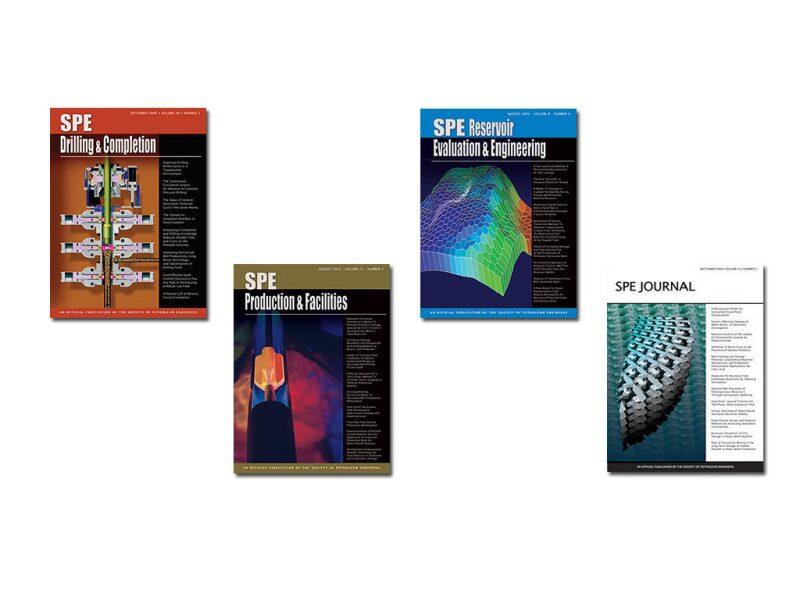In this edition, we are reminded that rigorous technical work is one of the pillars of our industry.
John Thorogood takes us down the path of learning as he reminds us why it is so important to keep ourselves informed of progress, especially of the peer-reviewed work highlighted in the technical journals our industry relies on. The article on giving technical presentations sends the message that no matter how good the work is, communicating it well is fundamental to its success.—Andrew Lambert, Pillars of the Industry Editor
At the recent SPE/IADC Drilling Conference in Amsterdam, I was talking to one of the leaders of the movement behind The Way Ahead. I asked him about readership of the Society’s technical journals among his age group. He remarked that it is low to very low, and one of the reasons for this is the lack of awareness of both the existence of the journals and of how they differ from the Journal of Petroleum Technology (JPT). One of the main reasons for the existence of The Way Ahead is to convey messages. He accepted my offer of an article as to why the journals play such an important role in the life of an engineering professional. Picking up his challenge, I would like to address four issues:
- How technical journals differ from other publications such as JPT and trade magazines.
- Why technical journals are important to the industry and the society.
- Why technical reading is important for the individual.
- The benefits that accrue from writing and reviewing papers.
By way of introduction, let me start by observing that regular reading of both technical journals and trade magazines has been central to my development as a drilling engineer. I have no doubt that I would not hold my present job and would not have been able to participate in SPE activities and enjoy the respect of my professional colleagues were it not, in large part, for the time and effort I devoted to technical reading. It was a habit instilled in me by my lecturers at university and reinforced by my first manager at Burmah Oil in 1973. This habit of absorbing information is complemented by the opportunities provided by SPE to contribute to the evolution of technology by writing papers. On one memorable occasion, when interviewing for a bit specialist to work in the technology group that I managed, the one candidate that stood head and shoulders above the rest was the individual that listed “technical reading” as one of his hobbies. He has subsequently gone on to a very successful career within the company, occupying positions of increasing seniority as his career has developed. Unfortunately, the habit of technical reading is rarely found in young engineers today, and it shows itself in the limited range of possibilities they consider when solving problems, or in their appreciation of what is technically possible.
State of the SPE Journals
During my time serving SPE, especially in the publications and conference-programming areas, I have been concerned about the very low subscription rate to the four quarterly technical journals: SPE Journal, SPE Drilling & Completion, SPE Production & Facilities, and SPE Reservoir Evaluation & Engineering. This range is expected to grow when the journals transition to publication in an electronic format. Out of a membership of approximately 65,000, the total number of subscribers to the four journals is just 10,835. Despite the alleged illiteracy of drillers, SPE Drilling & Completion is, surprisingly, the one that has always enjoyed the largest circulation, but even that is steadily declining with time.
JPT and Trade Magazines
JPT started off as a technical journal in its own right, with peer-reviewed papers and discussion of those papers. As SPE grew and became more international and technically diverse, the format of the journal changed to its present form. Nowadays, JPT is the Society’s monthly communication with members, containing news of Society events, technical and managerial papers, editorial comment, and a broad selection of brief articles. These brief articles first started in the mid-1990s and reflected the need to provide higher-level technical information to a more general readership. The contents reflect a need to provide breadth, rather than depth, of coverage. The present format of themed subject areas, summary articles, and a summary by a specialist in the subject area, with online access to full papers, is a unique and powerful way of keeping members updated with developments across the whole of petroleum engineering. However, while topical, the content comes with a “health warning” because it is not peer reviewed.
Commercial trade magazines fulfill a similar function. In addition to news and current industrial affairs, they may also contain technical articles, sometimes derived from conference proceedings. Although assisted by editorial committees, these magazines do not contain peer-reviewed papers. They constitute a very valuable resource, covering new technology developments and operational case studies as well as providing geographical diversity.
The Four SPE Technical Journals and Peer Review
The four technical journals fulfill a completely different function from that of JPT and other trade magazines. Technical journals are important for a learned society such as SPE and the industry it serves because they provide an essential forum where new technologies can be subject to open scrutiny, debate, and peer challenge. There are signs today that public opinion is becoming increasingly distrustful of experts in science and technology.1 There is a worrying shift away from rational, evidence-based argument toward more belief-based arguments. This can be seen in debates about genetically modified crops and alternative medicine. One can observe it in our own industry with the focus on PowerPoint summaries, brainstorming on flipcharts, and the growth of decision by e-mail.
While these may reflect the expedience of a slimmed-down, recession-driven industry, the lack of space for in-depth technical analysis reveals itself in a worrying trend of operational problems and silly mistakes. Rational, evidence-based argument has been the bedrock of the development of our society since the age of Enlightenment in the 18th century. The process of peer review supports the logical, evidence-based approach. Peer review is one of the defining features of a true learned society, in whatever discipline: medical, scientific, or engineering. It is a process that is widely used by learned journals and professional organizations around the world, and for which the standards of acceptability and publishability are well established and quite uniform across the many peer-reviewed publications. Peer review is an essential component of the healthy development of technology. The SPE peer-reviewed journals play a pivotal role in defining the present state of the art in petroleum engineering. Since they are at the heart of what a learned society stands for, an SPE without technical papers, peer review, and technical journals could not properly carry out its primary mission of being the premier agent for technology transfer within the industry.
Peer review is an essential part of the evolution of science and technology. For all its perceived problems, such as a trend to conformity with prevailing fashion and possible suppression of counterargument in controversial matters, it remains the best method for verifying and recognizing technical progress. The four journals and the associated editorial review process fulfill that function in petroleum engineering. Peer approval of a piece of work represents clear recognition of its worth. This status is recognized not only by publication in one of the four journals but also by clear designation in the SPE eLibrary. Therefore, when you are searching for information, a peer-approved paper comes with a higher quality rating than one lacking such approval.
Technical Reading and Personal Development
About 10 years ago, there was a lot of interest in “learning organizations.” There was an article in the June 1994 issue of JPT that described how Amoco had developed and applied a learning construct to its worldwide drilling organization.2 The six-point model of a learning organization is as true now as it was then and is well worth reviewing. One of the key attributes of a learning organization is that it must have an accessible knowledge base.
Those who forget their history are condemned to repeat it. The journals and the eLibrary represent the bedrock of the industry’s “accessible knowledge base.” While it may be comforting to know that it exists, and useful to have a powerful search engine, the engineer must first have an understanding of what it contains. When an engineer joins the industry, structured training assignments that require search of library information are a very valuable way of becoming familiar with what has been done before. Another good practice is to develop the habit of searching the eLibrary when following up operational problems or carrying out a technical study. Although nowadays a lot of assistance can be obtained from other sources such as SPE’s Technical Interest Groups and company internal bulletin-board systems, the eLibrary still remains the definitive source for proven technology.
There is a perception that technical papers are for experienced engineers only, that they become meaningful only after the engineer has gained several years of experience. This is an unfortunate impression because the technical and mathematical content of the vast majority of papers is accessible to those with a bachelor’s degree in a scientific or technical subject. Indeed, given the technical standard and intensity of the work that one does at university, it is much easier to enhance the habit of technical reading at the very start of one’s career rather than delaying for a few years and finding that one has to rebuild the skill from scratch.
Regular reading of journals, cover to cover, is a tedious and inefficient way of assimilating information. It is not to be recommended unless there are papers of particular interest to one’s technical specialty. In practice, it is not necessary to read technical papers in great depth unless searching for specific information. Rather, it is well established that the process of scanning papers allows the reader to pick up and store sufficient information to be able to recall it at a later date. The real value comes having scanned a wide range of papers over an extended period. Through its process of subconscious reflection, the brain can make connections, sometimes years later, that defy rational explanation. Scanning can be done by regular perusal of the journals, browsing conference proceedings, attending technical sessions at meetings, listening to papers, and regular reading of trade magazines as well. The brief article format of JPT supports this process. Regular technical reading feeds the subconscious, helps to “sharpen the saw,”3 and is part of the continuing education process that is the hallmark of an engineering professional.
Putting Something Back In: Writing and Reviewing Papers
Personal development is not just about reading papers and absorbing the technology. It is a two-way street; it is about writing them and giving something back to one’s peers. Writing technical papers hones communication skills. Apart from informing others of one’s own contributions and seeking challenge to, or validation of, one’s own thinking, it helps develop clarity of thought, argument, and presentation.
There is a further way in which the individual can contribute: by volunteering to become a technical editor for one of the journals that best suits one’s specialty. The technical editors, whose names appear inside the front cover of the journals, carry out the peer reviews and are the bedrock on which the system is based. To become a technical editor, one needs patience, time to carry out the reviews, and an in-depth knowledge of some aspect of the field of petroleum engineering.
The ability to review papers is a skill that must be developed. Each year, volunteers help new technical editors get started by running a 1-day training course on the Sunday before the SPE Annual Technical Conference and Exhibition. Attendance at this course provides an ideal opportunity for picking up the skills required of a reviewer, practicing reviewing papers and understanding some of the important techniques and pitfalls, as well as learning from experienced editors exactly how the system works. It also is another opportunity to extend one’s network among one’s technical peer group and gain experience from those from different backgrounds.
Being a technical editor has direct relevance to one’s day-to-day work. The real benefit of investing time and effort in developing the skill, apart from extending one’s technical knowledge, lies in developing the ability and confidence to carry out an objective and professional critique of work. Even in today’s industry, this is a very important skill that will pay off in terms of career progression.
Conclusion
We work in an industry that depends on technology for its success. Technical competence is fundamental to our ability to contribute, to innovate and to produce concepts, plans, and procedures that are safe and environmentally acceptable. Technical knowledge comes from an accumulation of experience. That experience is gained over a period of years and is the product of an investment of time and energy by the professional engineer. Technical reading is an essential part of an individual’s professional development. Reading is what the individual takes from SPE. Equally important is the contribution that the individual can make to the Society by writing and reviewing technical papers.
References
- Taverne, Dick: The March of Unreason: Science, Democracy and the New Fundamentalism, Oxford U. Press (2005).
- Hanni, G., Chambers, I., and Quay, W.: “Using a Drilling Management System To Build a Learning Organization,” JPT (June 1994) 502.
- Covey, S.R., The Seven Habits of Highly Effective People, Simon & Schuster, New York City (1990).
SPE TECHNICAL JOURNALS
SPE Journal: Includes fundamental research papers on all aspects of engineering for oil and gas exploration and production.
SPE Drilling & Completion: Covers horizontal and directional drilling, drilling fluids, bit technology, sand control, perforating, cementing, well control, completion technology, and drilling operations.
SPE Production & Facilities: Features papers on production operations, artificial lift, design and operation of surface facilities, downhole equipment, formation-damage control, multi-phase flow, workovers, and stimulation.
SPE Reservoir Evaluation & Engineering: Focuses on reservoir characterization, geology and geophysics, core analysis, well logging, well testing, reservoir management, enhanced oil recovery, fluid mechanics, performance pre-diction, and reservoir simulation.



